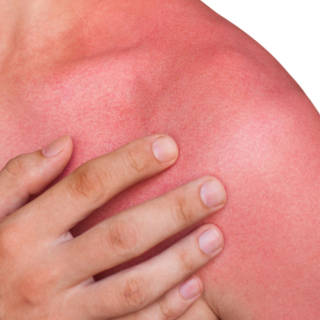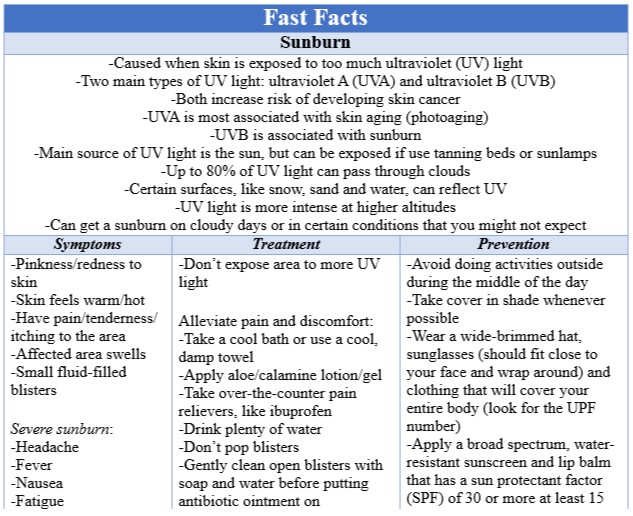Why is it so bad for your skin?
Who doesn’t love being outside in summer? There are so many activities to do. The only problem is that you’re exposed to the sun. While this does have certain health benefits, issues arise when you end up sunburned. Why is this such a problem? What can you do to prevent it from happening? How can you treat it?
 Definition
Definition
Sunburns are caused when your skin is exposed to too much ultraviolet (UV) light. UV light is a wavelength of light that is too small for the human eye to see. The two main types of UV light are ultraviolet A (UVA) and ultraviolet B (UVB). Both are bad for your skin and increase your risk of developing skin cancer. UVA is most associated with skin aging, or photoaging, and UVB is associated with sunburn. Photoaging is the weakening of your connective tissues. This decreases your skin’s elasticity and strength, which results in wrinkles, dry/rough skin, freckles, appearance of fine, red veins on your face and dark/discolored spots on your body. The main source of UVA and UVB is the sun, but you can be exposed if you use tanning beds or sunlamps. The pigment in your outer layer of skin that gives it its normal color is called melanin. When you subject your skin to UV light, your body increases the production of melanin in order to protect your skin. This is what makes your skin become a darker color. The important thing to know is that the amount of melanin your body produces is genetically determined and most people don’t produce enough to fully protect their skin. Another key thing to remember is that up to 80% of UV light can pass through clouds and certain surfaces, like snow, sand and water, can reflect UV. Also, UV light is more intense at higher altitudes. So, you can get a sunburn on cloudy days or in certain conditions that you might not expect.
Certain factors can increase your chances of developing a sunburn. If you have light skin, blue eyes and red or blond hair or have a history of sunburn, then you have a higher risk level. Also, if on a regular basis, your skin is uncovered in UV light from the sunlight or artificial sources, you chance of developing a sunburn are higher. People who work outside or live/vacation in sunny places or places with a high altitude are more likely to experience sunburn. Another issue is if you drink alcohol and spend time outside because you often don’t realize the extent of your sun exposure. Certain medications also increase your skin’s sensitivity to UV light, so it’s important to know if you’re taking anything that falls into this category.
Symptoms of a sunburn are pinkness/redness to your skin, your skin feels warm/hot, you have pain/tenderness/itching to an area, the affected area swells and/or you have small fluid-filled blisters. If you have a severe sunburn, you might also have headache, fever, nausea and fatigue. Your eyes are extremely sensitive to UV light, which means they can also be burned and this often feels like pain or grittiness. Any part of your body that is exposed can be burned, including earlobes, lips and scalp. The UV damage occurs for several hours after you get out of the UV light, so you might not know the extent of your sunburn until a few days after it happens.
Treatment
Most cases of sunburn can be treated at home. It will take several days for your skin to begin to heal. The best thing you can do during this time is to not allow the affected area to come into contact with more UV light. The other thing you can do is to alleviate your pain and discomfort. Taking a cool bath or using a cool, damp towel is helpful. Applying aloe/calamine lotion/gel helps to soothe irritated skin. Taking over-the-counter pain relievers, like ibuprofen, are a good way to decrease pain and swelling. Be sure to drink plenty of water so you don’t end up dehydrated. If you have blisters, don’t pop them. If the blisters do open, gently clean the area with soap and water before putting antibiotic ointment on the area. After several days, the area may begin to peel, which is the damaged skin falling off. Make sure you continue to moisturize the new skin and don’t expose it to UV light because it’s usually more sensitive. Avoid any products that have products that include ‘-caine’ in them, like benzocaine, because they can actually irritate your skin more.
If your sunburn is severe, then you should see a doctor. Symptoms of a severe sunburn include blisters that cover large portions of your body, you have a high fever/extreme pain/headache/ confusion/nausea/chills or your sunburn doesn’t start getting better after a few days. Occasionally, blisters can get infected and require medical treatment. If you have increased pain/tenderness, increased swelling, pus draining from a blister or red streaks coming from a blister, then your blisters might be infected and you need to be seen by a doctor.
Prevention
The best way to prevent sunburn is to be prepared. The UV light from the sun is most intense between 10AM and 4PM. So, if possible, avoid doing activities outside during this time and take cover in shade whenever possible. If you are going to be outside, wear a wide-brimmed hat, sunglasses (should fit close to your face and wrap around) and clothing that will cover your entire body. Some clothing even has UV protection built into the fabric, called ultraviolet protection factor (UPF). Also, it’s essential to apply water-resistant sunscreen and lip balm that has a sun protectant factor (SPF) of 30 or more at least 15 minutes before going outside. The sunscreen should also be broad spectrum, which means it will protect against multiple different kinds of UV light. For every 40 – 80 minutes that you’re outside, you should reapply sunscreen. If you are swimming or sweating, then you should reapply more frequently. An important thing to know is if you’re going to use bug repellent and sunscreen, put the sunscreen on first. On a side note, for babies and toddlers, use shade or clothing to keep them protected. If neither of these are available, use sunscreen that have actual physical blockers, like titanium oxide or zinc oxide. These are typically less irritating to their sensitive skin.
Sunburns are not only not fun, but they can be quite painful. By doing what you can to prevent one, you’re taking the steps to protect your skin not only now, but in the future. If you have any questions or concerns about sunburns, please speak with your doctor. If you would like more information, please visit the American Academy of Dermatology’s sunburn page at https://www.aad.org/public/kids/skin/skin-cancer/what-causes-a-sunburn